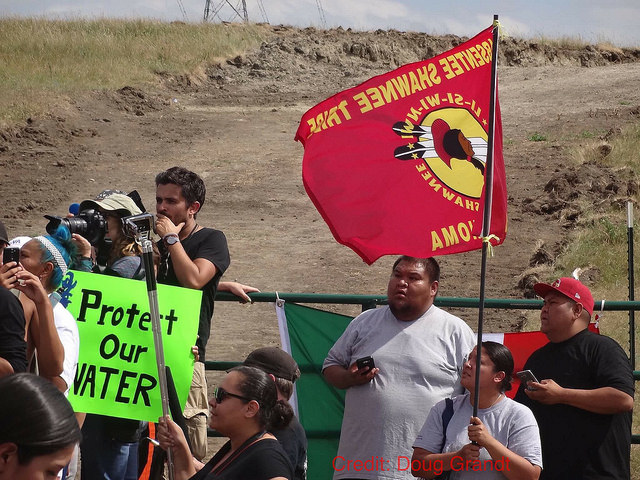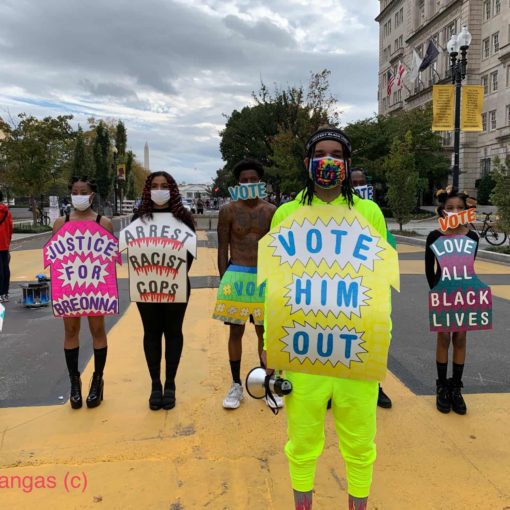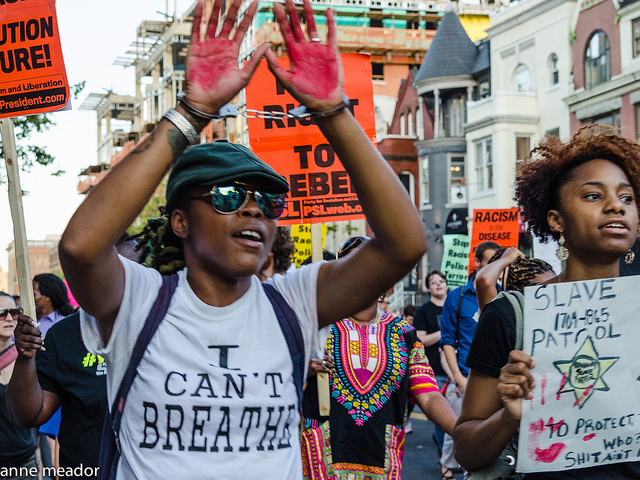
The Department of Justice on Friday issued a non-binding statement requesting a “voluntary pause on all construction” of the Dakota Access Pipeline near Standing Rock Sioux Reservation. The request was released jointly with the Department of Interior and U.S. Army Corps of Engineers and came immediately after U.S. District Court Judge James E. Boasberg ruled against a Standing Rock Sioux motion to stop construction of the pipeline near their reservation.
The joint statement was seen as a strong intervention in an intensifying standoff between Dakota Access, LLC and over 150 tribes encamped at three sites near Lake Oahe, and Cannon Ball, North Dakota. The Standing Rock Sioux have been locked in a battle with the Army Corps of Engineers and Dakota Access, LLC over the $3.8 billion Dakota Access pipeline with the future of the Standing Rock Sioux water rights and preservation of their ancient burial sites in the balance.
The three-agency request came a day after North Dakota Governor Jack Dalrymple activated the National Guard to support police and private security already deployed near the Sacred Stone and Sicangu Rosebud Camps in response to a massive influx of Standing Rock Sioux allies and supporters.
These developments are significant in showing that organized resistance can influence political forces to stop industry machinations dead in their tracks. In this case the rallying call of the Sioux drew thousands to its front lines in support of the water and land protectors, and challenged authority until it blinked.
By continuing steadfast and unpredictable actions, the Sioux have raised national and international awareness of indigenous strife, forcing the Obama administration to react against the energy industry standard of land grabs and pipeline permits which are almost never rejected.
Sacred Stone Camp Reacts to Statement with Jubilation
As copies of the DOJ joint statement were circulated, there were cheers of jubilation from end to end of the Sacred Stone camp. After a month of escalating conflict, there was a sudden outporing of celebration. Tribes held dance circles by fire sides and prayer groups at the banks of Lake Oahe and the Missouri River on Friday and Saturday morning.

As evening fell, the 7 Council of Fires, including the Dakota, Lakota and Nakota people, dressed in traditional attire and held a massive ceremony of thousands, welcoming everyone who came. “This was a hiatus to the construction of the Dakota Access Pipeline under Lake Oahe,” said Doug Grandt, an environmentalist who has been staying at the Sacred Stone camp for the last week.
“It’s not just about oil anymore,” said Grandt. “It’s the first time in 140 years the 7 Council Fires have come together with unity of the entire Sioux Nation.” The 7 Council Fires represent the seven divisions among the Dakota and has been traditionally referred to as the Great Sioux Nation. Grandt confirmed the spirit and camaraderie in the camps was strong as ever and growing in a common cause as the Sioux Nation came together not just to talk about land and water rights but to work through long standing disputes and discuss their future.
The Camp will not be disbanded as thousands of land and water protectors have gathered and many plan to remain there to “monitor the situation” until at least January 1, according to Grandt. They are ready with their next steps of actions against builders of the 1,172-mile pipeline in the event Dakota Access continues building, encroaches on traditional indigenous peoples land or further damages sacred burial sites which pipeline work crews bulldozed last week.
Grandt also said that National Guard troops deployed along the highway leading to the camps made it difficult getting through a road security check point where about a dozen guards were stationed. The Guard checkpoint outside Cannon Ball, was set up as an “information” point but a press release by Standing Rock Sioux reported that vehicles were being subjected to searches.
The physical conditions at the camp were becoming more difficult with Autumn. Rain over the past few days had muddied the main roads in the Sacred Stone Camp, challenging efforts to organize actions. It also stymied heavy earth moving equipment used by pipeline construction crews which had been idle anyway due to the temporary Court injunction.
Direct Actions Proved Effective
A series of protectors’ direct actions have already resulted in dozens of arrests. A brutal dog attack on peaceful protectors by a security firm near the reservation resulted in a cascade of overwhelming public support. As word spread of heavy police deployment, and the activation of the National Guard, even more joined in the days after the dog attack. The camps mushroomed in size from a few hundred to many thousands, requiring three separate camps to house and feed the massive influx.

Protectors organized under night cover and moved by early daylight, confounding construction crews. They used lock boxes to fasten their arms to bulldozers, stopping excavation for hours and preventing pipeline workers from progress on the project. Police came to cut their chains and dozens were arrested for trespassing.
In another action protectors spray painted graffiti on equipment. Green Party presidential candidate Jill Stein also spray painted equipment, and a warrant was issued for her arrest. Protectors were constantly challenging private security officers, rallying supporters to join the camps and were not afraid to push the envelope in how they could challenge authority.
Supporters arrived at the camps by car, canoe and kayak. Some even traveled along the Missouri River from Bismark in a large flotilla of canoes, a traditional means of travel, which effectively circumvented the National Guard check point.
Uncertainty Remains Despite Victory
There was, however, some amount of uncertainty over what would happen next.
“They understand this is not the end-all solution,” said Grandt. “The Tribes realize that although there is a moment of victory here, they have to reamain vigilant and continue to monitor the situation and be ready to respond.”
The standoff is not likely to escalate in the immediate future but legal maneuvering is still far from over, so the pipeline may still be built. The question remains: will the pipeline be stopped and if not, where will the new route be?





